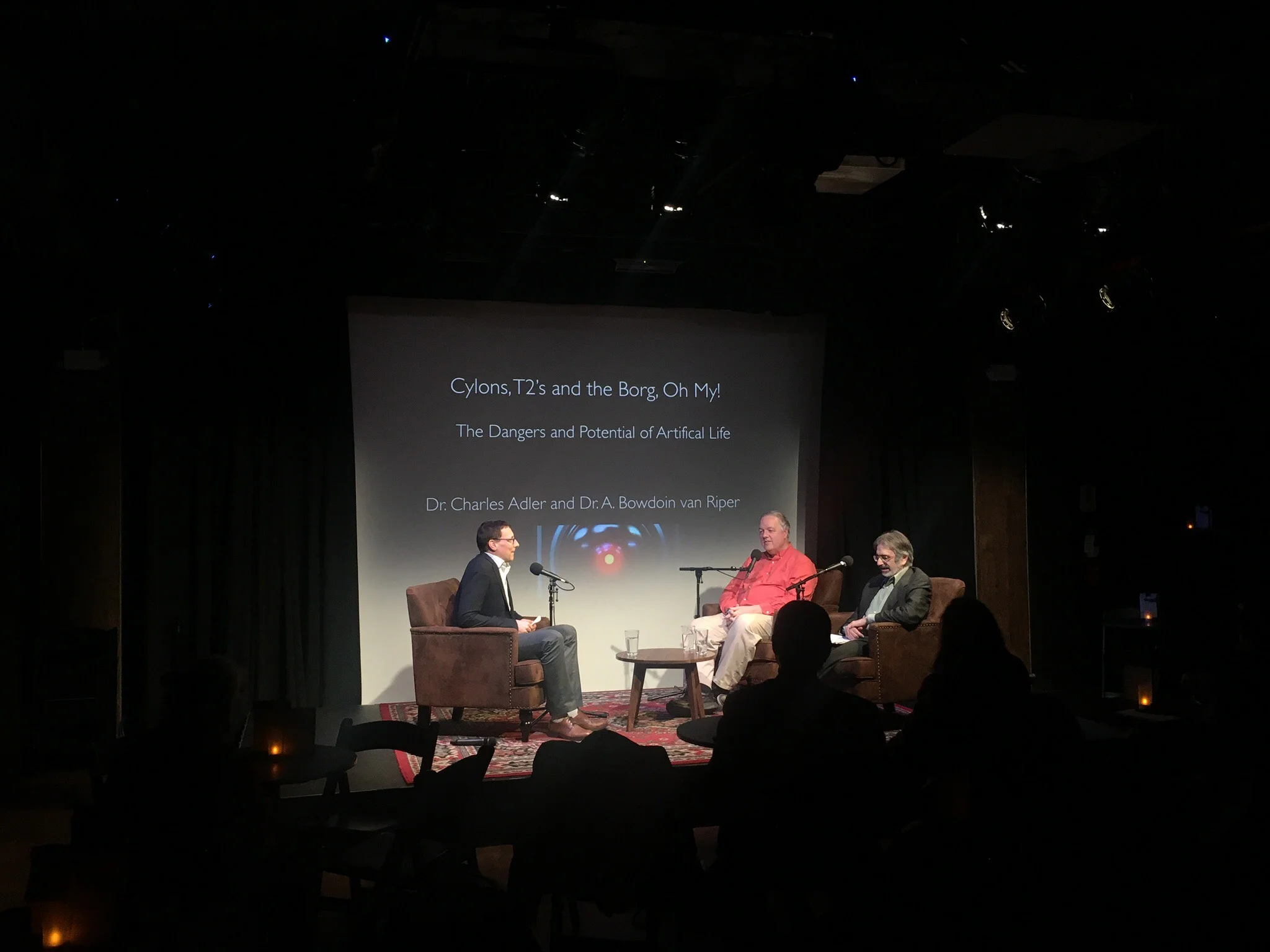This opinion piece was prompted by the recent publication of Stephen Hawking’s last writings, where he mentioned some ideas on superintelligence. Although I have the most utter respect for his work and vision, I am afraid some of it may be read in a very misleading way. I’ve been pondering whether or not I should write on the topic of the current “AI anxiety” for a while, but always concluded there would be no reason to, since I don’t have any strong opinion to convey about it. Nevertheless, there is just a number of myths I believe are easy to debunk. This is what I’ll try to do here. So off we go, let’s talk about AI, transhumanism, the evolution of intelligence, and self-reflective AI. (This piece was originally posted here.)
By Olaf Witkowski
In this post, I write about the problem of sphere packing and augmented communication in the future of the bio- and technosphere. In this post, we will explore how connecting these intelligent machines in the future, through an increasingly interconnected and extremely high-bandwidth network, can bring about new paradigms of learning. I’ll try to flesh out the reasons for the power of this new learning, and why it may make for technology with even faster learning than current levels. The secret ingredient may be found in the advent of optimal communication protocols, developed by AIs for AIs. (This piece was originally posted here.)
By Olaf Witkowski
What is intelligence? How did it evolve? Is there such thing as being "intelligent together"? How much does it help to speak to each other? Is there an intrinsic value to communication? Attempting to address these questions brings us back to the origins of intelligence. (This piece was originally posted here.)
By Olaf Witkowski
April 19, 2018 YHouse Cognition Lunch Salon at IAS
Presenter: Brian P. McLaughlin (Distinguished Professor of Philosophy and Cognitive Science; Director, Rutgers Cognitive Science Center)
Title: On the Matter of Robot Minds
Abstract: (By the presenter) “A number of AI researchers are predicting that there will be sentient robots with human-level intelligence or greater within the next thirty or so years. If this prediction is correct, we face enormously difficult moral and social issues. Status as a moral agent or moral patient depends only on mental abilities. Sentient robots would have moral rights, and so should have legal rights to protect them. Moreover, the sale of robots with intelligence even approaching human-level intelligence would be slavery. There is a tsunami of humanoid robots soon to enter our lives. I argue, however, that the prediction that sentient robots with human-level intelligence will soon be here is based, in part, on a false behaviorist assumption about mentality. Although the tsunami will bring a flood of difficult moral and social issues in its wake, robots rights is not among them. The robots will be devoid of mentality. They could be damaged or destroyed, but neither harmed nor wronged.”
Presenter: Torin Alter (University of Alabama)
Title: Enthusiasm about Russellian Monism
Abstract: (by the speaker) “According to Russellian monism, consciousness is constituted by intrinsic properties that underlie structural properties described by physics. Enthusiasm about this theory is on the rise. Is this enthusiasm justified? I will consider two reasons to think not. One is that the theory offers nothing truly new. The other is that it fails to deliver on its promise to well integrate consciousness into the natural, causal order. I will suggest that neither reason is compelling. I will also suggest that seeing why provides insight into what we should ask of a theory of consciousness and its place in nature.”
Nature of meaning has historically been planted in the field of philosophy, with good reason: up until couple decades ago, science limped behind philosophy in understanding matters of the mind. It wasn’t until advances in neuroimaging technology reached the functional stage, allowing for visually arresting images of our brains while we think and do and idle, that we started harvesting scientific evidence for some of the most complex theories about the way our brain works, about the how we come to perceive the world, acquire knowledge, and communicate with one another. Hayden Kee, a PhD candidate at Fordham University, wonders: can we turn to the science of language to help us get to a theory of meaning?
After more than forty weekly blog posts, my "Lucid Living" blog will take a break, to allow me to write a book manuscript, tentatively titled "Science, Cognition and Contemplation". It has been a real pleasure, to write several dozen vignettes on topics ranging from science to philosophy to aspects of contemplative traditions.
By Piet Hut
YHouse is looking for a part-time Event Coordinator. Read more and apply to join our rapidly-growing team!
As an astronomer, I am often asked how we can possibly understand such mysterious objects as black holes, distant in space, and the Big Bang, so very distant in time. The answer is simple: in the Universe, distant objects are often easier to understand than nearby ones.
By Piet Hut
In a very real way, you are much older than any of the rocks in any of the mountains you will ever encounter. Each living cell in your body is directly connected in an unbroken chain from LUCA, the Last Universal Common Ancestor, that lived about four billion years ago.
By Piet Hut
A few weeks ago I engaged in a fascinating conversation with Loch Kelly, a Buddhist meditation teacher, at the Rubin Museum in a program co-sponsored with YHouse. We were asked to shed some light on the topic of time, Loch from a Buddhist angle, and me from a physics angle. Interestingly, . . .
By Piet Hut
“Blessed are the forgetful: for they get the better even of their blunders”—Friedrich Nietzsche wrote in his philosophical work, Beyond Good and Evil. Nietzsche gave an aphorism, but not the method by which you and I might be bestowed such blessings. How exactly, then, do we forget blunders, trauma, and stress? How do we forget the memories that wrest from us our sense of well-being and happiness; the memories which pool as an unfortunate wellspring of such mental conditions like Posttraumatic Stress Disorder (PTSD)?
Large enough to host a crowd up to 120 people, but intimate enough to feel like you should bring your grandfather for a scotch to discuss the state of the world, Caveat forms the perfect stage for a YHouse event. With its wood-panelled walls, easy leather armchairs in the corner, a Persian carpet on the stage, and a drink in your hand, you’re going on a comfortable night out whilst feeding yourself on new knowledge and insights.
Last Monday, I visited one of the recurring events on artificial life for the first time, called “Cylons and T2s and the Borg—Oh My!: The Dangers and Potential of Artificial Life.” Physicist Dr. Charles Adler and historian Dr. A Bowdoin van Riper were invited to tackle ideas from science fiction, world culture, science, and philosophy, as well as to pose answers to a variety of questions from the audience. The event was moderated by YHouse’s deputy creative director Sean Sakamoto.
Last week I wrote about my astrophysics activities in the virtual world of Second Life. This week I'm looking back on another initiative that I started there, called Play as Being -- an exploration of what you are, by learning to turn your gaze away from what you have.
By Piet Hut
Synopsis of our March 15, 2018 YHouse Luncheon talk by Kenji Doya
Presenter: Kenji Doya (Okinawa Institute of Science & Technology, Japan)
Title: How Does the Brain Wire up Itself on the Fly?
Abstract: “The standard paradigm in functional brain imaging is to ask subjects to perform tasks requiring a certain computation or not, to see which brain areas are more activated, and to conclude that those areas subserve the computation. However, we do not really know why and how those specific brain areas can be activated and connected when they are needed. As deep learning provides solutions to specific computations like image recognition and language processing, how to select and combine those networks as needed in different tasks and situations is a critical challenge in general and autonomous artificial intelligence. In this talk, we will explore possible anatomical and computational mechanisms that realize modularity and compositionality of the brain.”
Synopsis of YHouse Luncheon 3/8/18 Michael Solomon and Olaf Witkowski
Title: Ethics and A.I.
Abstract: “We are sharing this article in hopes of stimulating discussion at our Thursday March 8th meeting. The topic will be Ethics and A.I. Is it possible to program ethical values in the machines we use and have come to rely on? Can we even agree on fundamentals like “Do unto others...” or “Thou shalt not kill”? Is Diversity an obstacle to finding shared values? Can urban surveillance cameras with facial recognition be used to prevent crime and terrorism, without being used by authoritarian governments to weed out dissent? Can we have Transparency in decision making when no one can determine how neural networks reach conclusions? Ethics choices may not be between good and evil, but more often involve conflicting goods. Can we make better policies and choices with A.I. than we can without it? Please share this with others who may be interested in attending.”
https://www.deseretnews.com/article/900010378/personal-robots-are-coming-into-your-home-will-they-share-your-family-values.html
It is hard to predict the future. Twelve years ago, Second Life (SL) began to make headlines. There were predictions that soon business cards would not only list email addresses, but also avatar names, uniquely pointing to the animated characters in SL that represented the owners of the cards . . .
By Piet Hut
Synopsis of the 3/1/18 YHouse Luncheon Talk at IAS by Catherine Prueitt and Piet Hut
Presenters: Catherine Prueitt (George Mason University) and Piet Hut (Institute for Advanced Study) Title: Beyond or Not Beyond Abstract: “Cat and Piet will continue an ongoing dialogue they started a few weeks ago at Columbia about the notion of exploring the notion of beyond in theory and experiment, in science and contemplation, as well as in daily life. Cat, a philosopher, and Piet, an astrophysicist, share a deep and burning interest in the question of how humans construct and experience the world they live in and themselves who live in it.”
The most important lesson that I learned from scientific research has little to do with any of the fascinating results that I witnessed and contributed to in astrophysics and other fields. Nor is it related to the amazing tools and techniques that have been developed in the last few hundred years. Rather, it has been the training in dropping stories.
By Piet Hut
In the history of science, philosophy has always seemed to be detached from the rest of natural science. Yet phenomenology offers a unique perspective of understanding our experience and life, and this workshop aimed to find ways to bridge the gap between the scientific attitude and the phenomenological attitude.








![[#41] Science, Cognition, and Contemplation: A Book Project](https://images.squarespace-cdn.com/content/v1/585711b3ebbd1a051da20b4d/1524300868538-D530VH5XQRLYQ8KA3M3L/Biblioteca_Gambalunga_%28Rimini%29-4.jpg)

![[#40] So Far and yet So Near](https://images.squarespace-cdn.com/content/v1/585711b3ebbd1a051da20b4d/1523579098858-S4GA7PNEDMCTFD8LVSSV/Creation_of_Adam_Michelangelo.jpg)
![[#39] Naming Your Ancestors](https://images.squarespace-cdn.com/content/v1/585711b3ebbd1a051da20b4d/1523054352800-YIVFP572DU36VXL5YERY/ancestors.jpg)
![[#38] Talking about Time in Science and Contemplation](https://images.squarespace-cdn.com/content/v1/585711b3ebbd1a051da20b4d/1522454328884-BUO57S51DVDYWBTNC6B6/Loch-Piet-1-shorter.jpg)


![[#37] Play as Being: From What You Have to What You Are](https://images.squarespace-cdn.com/content/v1/585711b3ebbd1a051da20b4d/1521976912549-ZNZ3RS4PP3365QRW9FJB/pab-teahouse-2.jpg)


![[#36] MICA: the Meta Institute for Computational Astrophysics](https://images.squarespace-cdn.com/content/v1/585711b3ebbd1a051da20b4d/1521391016972-QITZLGTOV2MCKN7GVVWJ/MICA-full-pic.jpg)
![[#35] Playing as if Dropping Stories](https://images.squarespace-cdn.com/content/v1/585711b3ebbd1a051da20b4d/1520779777578-GD7RRH0IPVC4RBNQDEFJ/lost-dwarves.jpg)
